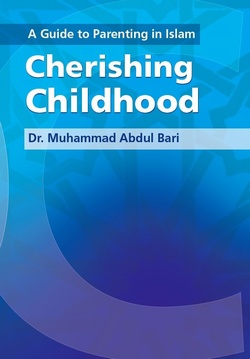
Author: Dr. Muhammad Abdul Bari
Publisher: Ta-Ha Publishers Ltd
Release Date: January 2015
Pages: 101
In Cherishing Childhood, Dr Muhammad Abdul Bari draws on his experiences as an educationalist, long-standing community worker and parent to offer a compassionate guide for good parenting. Cherishing Childhood is a concise and easy read, focussing on the steps to nurture a sense of spirituality from the earliest days. There is much wisdom and practical advice to be found within its 100 or so pages: Chapter One, ‘A Trust from Allah’; Chapter Two, ‘Parenthood and the Age of Nurturing’; Chapter Three, ‘Infancy and the Pre-School Years’; Chapter Four, ‘Primary School Years’; Chapter Five, ‘Home Environment’; Chapter Six, ‘Building Muslim Character’. The author’s own gentle and calm character permeates through the account.
The book is an amalgam of homilies and advice from an elder. Above all it conveys the importance of care and love: ‘the relationship between parents and children is at the heart of the family. When this love is pure and strong, it filters out to encompass love for brothers, sisters, uncles, aunts and so on’. Children bereft of such love often find it difficult in later life to love others. The book has many practical tips, such as the importance of putting up a timetable on the family noticeboard, dealing with tantrums (‘calm and patient parents are more likely to breed calm and patient children’) and the importance of joint reading. He warns against a permissive style of parenting – where there is a reluctance to make any demands on the children nor impose any form of discipline or authority. He says that ‘this is tantamount to an abuse of the parent-child relationship. It is the duty of the parents to guide and nurture their children into the best human beings that they can be based on their greater life experience. To hand over the reins of responsibility to the children themselves is irresponsible and neglectful. As a result, these children tend to be immature and self-centred.’
Dr Bari writes at a time when the stereotypical gender roles of the wife as the home-maker and child carer and the husband as breadwinner are increasingly blurred. More and more young British Muslim girls are now in higher education, emerging with a university degree, often better educated than their spouses and with natural career expectations. The 2011 Census indicates that there are parts of Britain where the number of Muslim women in full-time education is more than men. Dr Bari however treads a conservative line on the issue, though well-aware of the tensions. In his view the ‘ideal scenario’ when a child is born is for the mother to stay at home with her child until the child is ready to go to school: ‘like a sculptor, the parent must take the raw material and carefully coax and soothe and shape it into a thing of beauty. This requires time and effort. . . Mothers that have worked full-time outside the home prior to having children may feel frustrated at the lack of intellectual stimulation and social life on becoming a stay-at-home mother. They may also feel the loss of their own income and the independence that goes with it. These are valid and normal feelings. However, motherhood is an honour and privilege. It is not bestowed to everyone and the early years of child’s life pass very quickly. The mother can return to full-time work when the child goes to school.’ He accepts that ‘. . .it may be that there is no other option except that both parents have to work in order to ensure a basic standard of living for the family. In this case there are a few options that can be explored in order to minimise the negative effects on children. It may be possible that one of the parents can work part-time or that both parents can work flexibly in order for there to be a parent at home some of the time. It is worth talking to members of the extended family such as aunts and grandparents, or friends, who may be able to offer childcare in a wholesome and Islamic environment’.
Dr Bari is very much against depositing babies with non-Muslim child-minders or for making TV a surrogate ‘childminder’: ‘even children’s programmes may show inappropriately dressed people, permissiveness of pop music and dancing, disrespect of elders and wasting of food, to name a few. Over time these silently corrode the values and ethos that Muslim parents have worked so hard to instil!’
Good parenting is a challenge for the young nuclear family in the urban context where either by choice or necessity both parents have to be professionally active, either to make ends meet or to ensure their skills do not become obsolete. Dr Bari’s own rule – ‘I have followed the broad Islamic principle that anything not forbidden in Islam is acceptable’ – is one that can guide families in making difficult decisions. Muslim civil society is faced with many challenges in the decades ahead, not least in the need for systems that can provide culturally sensitive child care at one end of the life cycle, and elderly care homes at the other.
M. A. Sherif, 2015
